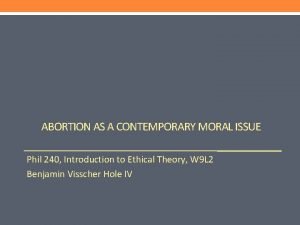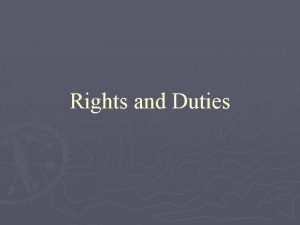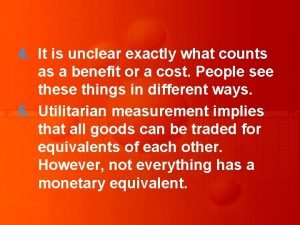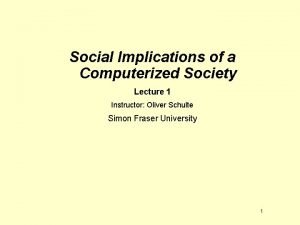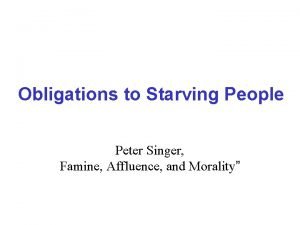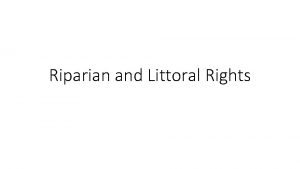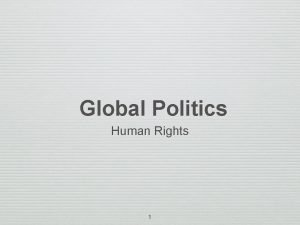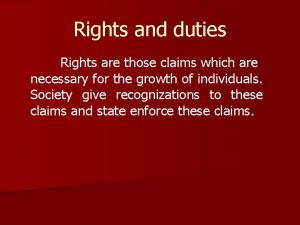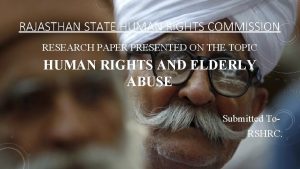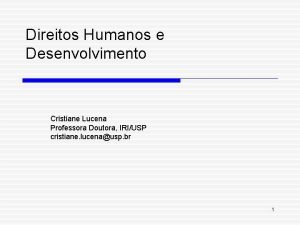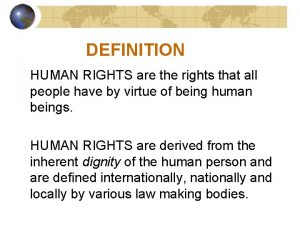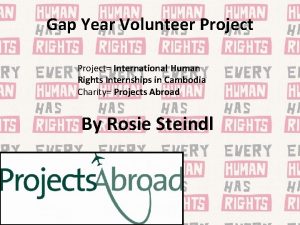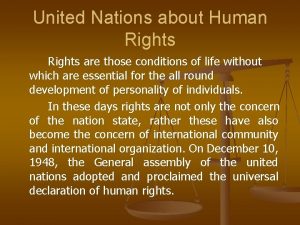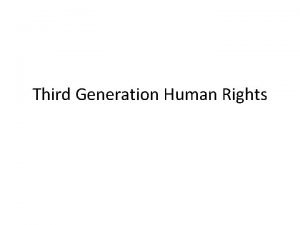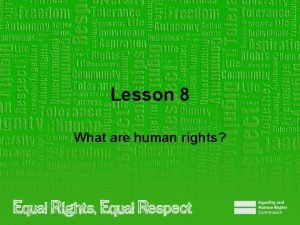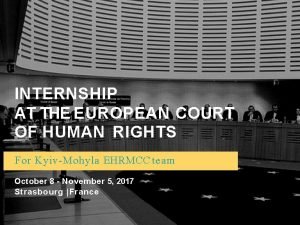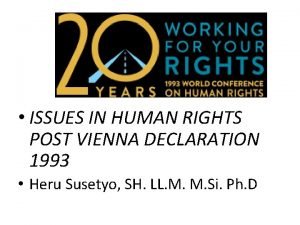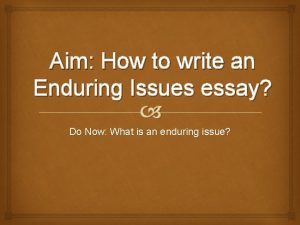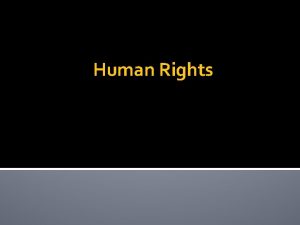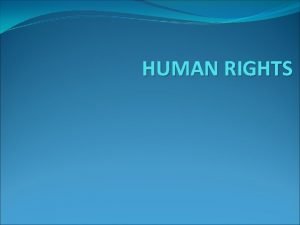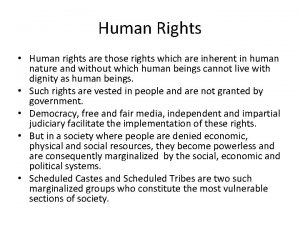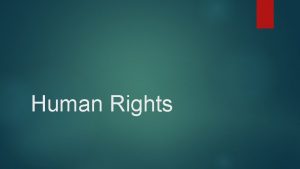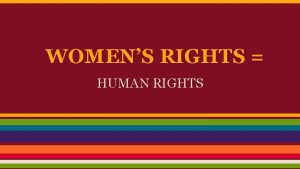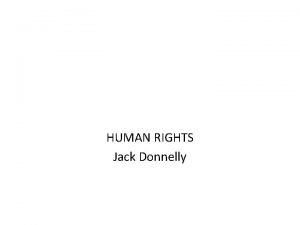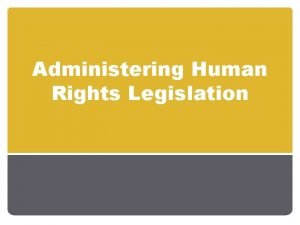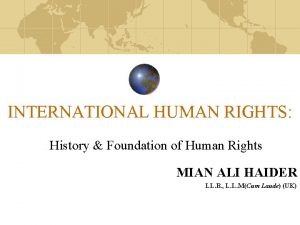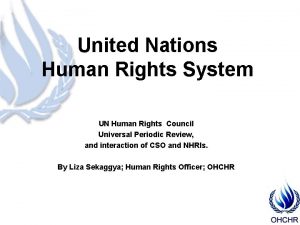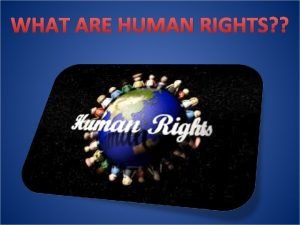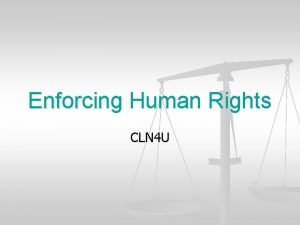Human Rights What are Human Rights Human rights



















- Slides: 19

Human Rights What are Human Rights? Human rights include the right to life and liberty, freedom from slavery and torture, freedom of opinion and expression, the right to work and education, and many more. Everyone is entitled to these rights, without discrimination.

International Human Rights Law International human rights law lays down the obligations of Governments to act in certain ways or to refrain from certain acts, in order to promote and protect human rights and fundamental freedoms of individuals or groups. One of the great achievements of the United Nations is the creation of a comprehensive body of human rights law—a universal and internationally protected code to which all nations can subscribe and all people aspire. The United Nations has defined a broad range of internationally accepted rights, including civil, cultural, economic, political and social rights. It has also established mechanisms to promote and protect these rights and to assist states in carrying out their responsibilities.

The foundations of this body of law are the Charter of the United Nations and the Universal Declaration of Human Rights, adopted by the General Assembly in 1945 and 1948, respectively. Since then, the United Nations has gradually expanded human rights law to encompass specific standards for women, children, persons with disabilities, minorities and other vulnerable groups, who now possess rights that protect them from discrimination that had long been common in many societies.

Universal Declaration of Human Rights The Universal Declaration of Human Rights (UDHR) is a milestone document in the history of human rights. Drafted by representatives with different legal and cultural backgrounds from all regions of the world, the Declaration was proclaimed by the United Nations General Assembly in Paris on 10 December 1948 by General Assembly resolution 217 A (III) as a common standard of achievements for all peoples and all nations.

It sets out, for the first time, fundamental human rights to be universally protected. Since its adoption in 1948, the UDHR has been translated into more than 500 languages - the most translated document in the world and has inspired the constitutions of many newly independent States and many new democracies. The UDHR, together with the International Covenant on Civil and Political Rights and its two Optional Protocols (on the complaints procedure and on the death penalty) and the International Covenant on Economic, Social and Cultural Rights and its Optional Protocol, form the so-called International Bill of Human Rights.

Human Rights Constitution of Pakistan Constitution is the set of fundamental laws/principles may be written or unwritten on which a country is acknowledged to be governed. ” Human Rights came into force on 3 rd September 1953. When the first constitution of Pakistan was made on 1956 then the International human rights law are the part of our constitution. Universal Declaration of Human Rights having 30 articles and has been created especially for young people.

Articles of Human Rights �We are all born free & equal: We are all born free. We all have our own thoughts and ideas. We should all be treated in the same way. �Don’t Discriminate: These rights belong to everybody, whatever our differences.

�The Right of Life: We all have the right to life and to live in freedom and safety. �No Slavery: Nobody has any right to make us a slave. We cannot make anyone our slave. �No Torture: Nobody has any right to hurt us or to torture us.

�Right where to Go: I am a person like you! We have a right no matter where to go. �All Equal before law: The law is the same for everyone. It must treat us all fairly. �Right Protected by Law: We can all ask for the law to help us when we are not treated fairly.

�No Unfair Detainment: Nobody has the right to put us in prison without good reason and keep us there or to send us away from our country. �Right to Trial: If we are put on trial this should be in public. The people who try us should not let anyone tell them what to do. �We are always innocent till proven guilty: Nobody should be blamed for doing something until it is proven. When people say we did a bad thing we have the right to show it is not true.

�Right to Privacy: Nobody has the right to come into our home, open our letters or bother us or our family without a good reason. �Freedom to Move: We have the right to go where we want in our own country and to travel as we wish. �Right to a Nationality: We all have the right to belong to a country.

�Marriage and Family: Every group up has the right to marry. Men and women have the same rights when they are married and when they are separated. �Right to Own Things: Everyone has the right to own things or share them nobody should take our things from us without a good reason. �Freedom of Thought: We all have the right to believe in what we want to believe to have a religion or to change it.

�Freedom of Expression: We all have the right to make up own mind to think what we like, to say what we think and to share our ideas. �Right to Democracy: We all has the right to take participate in the government of our country, and we also has a right to choose our leader. �Social Security: We all have the right to affordable housing, education and childcare, enough money to live on and medical help if we are ill or old.

�Workers Right: We has the right to do a job, to a fair wage of our work and can join a trade union. �Right to Play: We all have the right to rest from work and to relax. �Right of Food and Shelter: We all have the right to a good life. We all have the right to eat good food and lives in a good home.

�Right of Education: Education is a right. Primary school should be free. Our Parents can choose what we learn. �Responsibility: We have a duty to other people and we protect their rights and freedoms. �Copyright: We all have right to our own way of life and to enjoy the good things that art, science and learning bring.

Current Human Rights Issue in Pakistan �Human beings are born free but are encountering a number of issues that eventually snatch their freedom and make them slaves. �Religious Minorities ( Misuse of Blasphemy law) Most of those facing blasphemy are members of religious minorities, often victimized by these charges due to personal disputes. �Attacks on civil society. A civil society is a community of citizens linked by common interests, and in Pakistan some aspects of civil society are under attack.

�Freedom of Expression and Attacks on Civil Society Many journalists increasingly practice self-censorship, fearing retribution from security forces, military intelligence, and militant groups. Media outlets in 2016 remained under pressure to avoid reporting on or criticizing human rights violations in counterterrorism operations. �Freedom of religion. In 2017, there were at least 19 people on death row under blasphemy charges, many of whom were members of religious minorities in Pakistan. This situation, combined with many others, has put Pakistan at a severe level of ‘violations of religious freedom’ — religious minorities and atheists are at a higher risk than ever before.

�Women’s and Girls’ Rights Child marriage remains a serious concern in Pakistan, with 21 percent of girls marrying before the age of 18. Violence against women and girls—including rape, murder through so-called honor killings, acid attacks, domestic violence, and forced marriage—remained routine. Pakistani human rights NGOs estimate that there about 1, 000 “honor killings” every year. Children’s rights. Child marriage is a major concern in Pakistan, with 21 percent of girls under the age of 18 already married. Along with child marriages, lack of education also heavily impacts children in Pakistan.

How Human Rights can be Protected �A fair and independent judicial system. �By creating awareness among the people about their rights. �Rights of the communities must be looked after.
 Mikael ferm
Mikael ferm Positive rights vs negative rights
Positive rights vs negative rights Legal rights vs moral rights
Legal rights vs moral rights Negative right
Negative right Positive rights vs negative rights
Positive rights vs negative rights What are negative rights
What are negative rights Riparian doctrine
Riparian doctrine Negative rights vs positive rights
Negative rights vs positive rights Duties towards self
Duties towards self State human right commission rajasthan
State human right commission rajasthan Figura 1 human rights
Figura 1 human rights Definition of rights
Definition of rights Projects abroad human rights office
Projects abroad human rights office Need of human rights education
Need of human rights education Third generation rights
Third generation rights What are you human rights
What are you human rights Traineeship european court of human rights
Traineeship european court of human rights Vienna declaration of human rights
Vienna declaration of human rights Human rights history
Human rights history Enduring issues essay global 10
Enduring issues essay global 10

